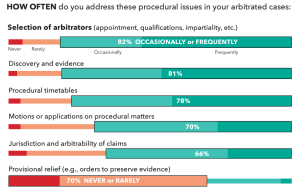Selecting an Arbitrator for Labor Arbitration Proceedings
Selecting an arbitrator to oversee a labor and employment dispute is a pivotal part of the arbitration process. In our most recent State of Practice Survey of law firm and in-house attorneys, those legal professionals currently involved in arbitration proceedings report that choosing an arbitrator is the procedural issue they address most often – more frequently than discovery and evidence or procedural timetables.

While labor contracts may differ in how they specify an arbitrator will be selected, representatives of each party should be prepared to conduct due diligence of possible arbitrators and have clear selection criteria.
This checklist will help both union and management representatives in selecting arbitrators in labor arbitration proceedings. While there are countless factors parties might consider when selecting an arbitrator to preside over labor-related arbitration, these are a few that are common to many cases.
[Download the labor arbitration preparation checklist below as a PDF to get started shaping your labor arbitration strategy.]
Review requirements in the bargaining agreement
Since labor arbitration is rooted in the collective bargaining agreement (CBA), review relevant terms in your agreement for requirements related to choosing an arbitrator. For instance, you may be required to use a certain arbitration service, like the American Arbitration Association or Judicial Arbitration and Mediation Services, or follow special procedures for choosing an arbitrator. Review and understand any applicable terms before proceeding.
Understand what rules apply
Once you have determined the forum for arbitration, determine which rules will apply to the selection of the arbitrator. Arbitration services have their own arbitration rules that provide for the selection of arbitrators. Some services even have rules unique to labor arbitration. Local laws may also govern how arbitrators are selected. Review and understand these rules, and how they relate to any relevant terms from the CBA, so that you know how an arbitrator will be chosen.
Consider geography, if relevant
When arbitration is conducted in person, selecting an arbitrator in your geographic area is important for logistics. Also, if your CBA provides that arbitration must take place in a specific venue or jurisdiction, make sure you’re considering arbitrators in that locale. On the other hand, a specific location may be irrelevant if your arbitration takes place remotely, as has become more common since the Covid-19 pandemic.
Explore potential bias
Perhaps the most considered factor is whether an arbitrator is biased against or in favor of unions or management. This calculus is mostly based on reviewing arbitrators’ past decisions to search for indications of bias in favor or against unions or management.
While it’s tempting to select arbitrators based on their respective “win ratios,” remember that your opposing party will likely veto arbitrators that it views as hostile to their side. You should focus on choosing an arbitrator you believe will render a fair and well-reasoned resolution to your dispute, and not solely on your likelihood of winning.
Look at the arbitrator’s professional experience
In some disputes, your arbitrator may benefit from specific professional experience to better understand the legal and factual issues in your case. While a background in labor arbitration is obviously key, knowledge in other legal fields, such as relevant state and local laws or a particular industry, may be helpful for your arbitrator to render a more comprehensive decision.
Ask for firsthand experience with arbitrators
Consider reusing arbitrators with whom you have worked in the past. Ask colleagues for recommendations; some of the most valuable opinions on arbitrators may come from their experiences. Don’t automatically exclude arbitrators who have rendered adverse decisions to you or similarly situated parties unless you suspect bias.
Think about how to structure the arbitration board
There are several variations on how arbitration panels may be structured, which may be governed by your CBA or arbitration rules. Some disputes have only one arbitrator, while others may have panels of three or more. Arbitration boards can be entirely neutral or may be “tripartite” – composed of one neutral person, one union representative, and one management representative. “Temporary” or “ad hoc” arbitrators are chosen to resolve one specific dispute or group of disputes, while a “permanent” arbitrator can be chosen to resolve disputes between parties for a certain period of time.
Authoritative analysis of labor arbitration law
From live events to in-depth reports, discover singular thought leadership on labor arbitration law from Bloomberg Law. Our network of expert labor and employment law analysts are always on the case – so you can make yours. Download our labor arbitration preparation checklist to get started shaping your labor arbitration strategy.
The challenges are real. So are our solutions. Save valuable time when you trust Bloomberg Law research solutions to tackle complex labor arbitration tasks with ease. Request a demo today to get started.